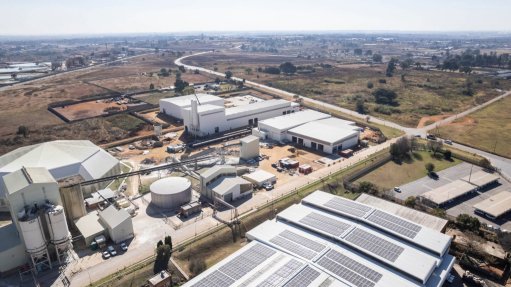Current climate regulations not driving change fast enough
Carbon-related regulation is increasing worldwide, alongside increased public scrutiny and demand for emissions reporting, specifically for large emitters, such as mining and related industries, observes business consultancy Emergent Africa sustainability solutions lead Lee Swan.
Targets and measures for reducing carbon emissions continue to emerge and evolve. As do sustainability reporting obligations and expectations. One such set of requirements is the Corporate Sustainability Reporting Directive (CSRD), by the European Union (EU).
Swan says CSRD means that small, medium-sized and large organisations operating in the mining sphere will likely be expected to report on carbon emissions, even if the corporate entity is not domiciled in an EU member State. Companies which conduct “substantial business” in the EU or have securities listed on EU-regulated markets must also comply with the CSRD.
She also cites the US, where GHG reporting is mandatory for large emitters, while several states have their own, more demanding legislation in place, such as the Global Warming Solutions Act, in Massachusetts and California.
Swan suggests that, as more countries follow suit, staying ahead of the curve on GHG reporting and carbon accounting has become crucial for mining companies, especially those reliant on international investors and those with global footprints and value chains.
While the measurement and reporting of Scope 1 and Scope 2 emissions tends to be easier the most significant reduction potential lies in Scope 3 emissions, which lie outside of an organisation’s direct control.
Swan says that currently elements of Scope 3 emissions calculations often rely on estimates and assumptions, in lieu of accurate data – this will need to improve quickly, given the degree of accuracy required to appropriately plan for pathways to achieve net zero.
Fortunately, Scope 3 data availability and measurements are likely to significantly improve in future, as organisations which have publicly presented their emissions reductions or net-zero commitments push for increased transparency in their value chains.
However, according to the 2022 United Nations Environment Programme (UNEP) Emissions Gap Report, there is “no acceptable path to 1.5 °C” and various 2030 pledges, if delivered completely, would still result in a global increase of about 2.5 °C, which will, in turn, result in systemic climate changes and an increase in extreme weather events globally. Swan says these pledges include national climate change mitigation pledges – nationally determined contributions – and long-term pledges such as net-zero pledges, specifically reductions in GHG emissions, which are collectively referred to as “carbon dioxide equivalents”. Miners will, therefore, need to drastically accelerate efforts to significantly reduce GHG emissions. As an added incentive, Swan also notes that there is growing customer awareness of miners’ impact on the environment which is driving demand for organisational change.
“In the UK, the ethical consumerism market doubled in only a decade, from €55-billion in 2012 to €117-billion in 2022.”
Consequently, prioritising environment, social and corporate governance strategies, and performance reporting on capital and asset access, will result in benefits beyond mitigating climate change, such as attracting employees and customers.
The Stakes
Since pre-industrial times, global surface temperatures have warmed by 1.1 °C because of GHG emissions. The resulting climate change has led to food and water shortages, increases in the price of goods, an impact on fishing and agriculture, as well as an increased risk of mass extinction for some species, says Swan.
“Biodiversity loss and shifts directly impact on food production systems as well as the ability of the planet to self-regulate across multiple biophysical systems.”
Irreversible damage can be avoided, but action must be swift to avoid certain critical tipping points.
With global emissions needing to reduce by 45% to 50% by 2030, and goals relating to net zero largely positioned as 2050 targets, the next few years will prove crucial, Swan concludes.
Article Enquiry
Email Article
Save Article
Feedback
To advertise email advertising@creamermedia.co.za or click here
Comments
Press Office
Announcements
What's On
Subscribe to improve your user experience...
Option 1 (equivalent of R125 a month):
Receive a weekly copy of Creamer Media's Engineering News & Mining Weekly magazine
(print copy for those in South Africa and e-magazine for those outside of South Africa)
Receive daily email newsletters
Access to full search results
Access archive of magazine back copies
Access to Projects in Progress
Access to ONE Research Report of your choice in PDF format
Option 2 (equivalent of R375 a month):
All benefits from Option 1
PLUS
Access to Creamer Media's Research Channel Africa for ALL Research Reports, in PDF format, on various industrial and mining sectors
including Electricity; Water; Energy Transition; Hydrogen; Roads, Rail and Ports; Coal; Gold; Platinum; Battery Metals; etc.
Already a subscriber?
Forgotten your password?
Receive weekly copy of Creamer Media's Engineering News & Mining Weekly magazine (print copy for those in South Africa and e-magazine for those outside of South Africa)
➕
Recieve daily email newsletters
➕
Access to full search results
➕
Access archive of magazine back copies
➕
Access to Projects in Progress
➕
Access to ONE Research Report of your choice in PDF format
RESEARCH CHANNEL AFRICA
R4500 (equivalent of R375 a month)
SUBSCRIBEAll benefits from Option 1
➕
Access to Creamer Media's Research Channel Africa for ALL Research Reports on various industrial and mining sectors, in PDF format, including on:
Electricity
➕
Water
➕
Energy Transition
➕
Hydrogen
➕
Roads, Rail and Ports
➕
Coal
➕
Gold
➕
Platinum
➕
Battery Metals
➕
etc.
Receive all benefits from Option 1 or Option 2 delivered to numerous people at your company
➕
Multiple User names and Passwords for simultaneous log-ins
➕
Intranet integration access to all in your organisation

















